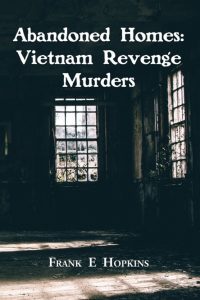Interview With Author Frank E. Hopkins
 And the winner is… Abandoned Homes: Vietnam Revenge Murders by Frank E. Hopkins was recently named best book of the year in the mystery/thriller genre by the Maryland Writers’ Association. It’s a tale of murder discovered thirty-five years after the crime, and the novel allows Hopkins to reach back to the Vietnam War era to explore the anger and division that tore America apart. Frank, who is also the author of two other novels—Unplanned Choices and The Opportunity—was kind enough to talk with us about his work.
And the winner is… Abandoned Homes: Vietnam Revenge Murders by Frank E. Hopkins was recently named best book of the year in the mystery/thriller genre by the Maryland Writers’ Association. It’s a tale of murder discovered thirty-five years after the crime, and the novel allows Hopkins to reach back to the Vietnam War era to explore the anger and division that tore America apart. Frank, who is also the author of two other novels—Unplanned Choices and The Opportunity—was kind enough to talk with us about his work.
Frank, I’d like to start with a question I sometimes ask myself. You and I both started writing seriously – or at least started publishing – after we retired. Do you have any regrets that you didn’t begin much earlier?
I do have regrets I didn’t start earlier. I used graduate school, marriage, work, raising children, and divorce as an excuse for not writing fiction. I advise all potential writers to start early.
In Abandoned Homes, you take readers back to the Vietnam War era, and the way it split Americans here at home. Why go back to that now?
Since our involvement in Vietnam ended in 1975, those born after 1965, or under 53 have no appreciation for the impact of a large war. It is important for our political future for citizens to learn about the past follies of war-loving politicians – Vietnam and Iraq 2.
Do you see parallels between the divisions in American society then and today?
 Yes, the political struggles that occurred then still exist: presidential credibility, engagement in unnecessary wars, the Civil Rights movement, women’s rights, and voting rights. During the 1960s, we had a president who lied about the Vietnam War; now we have a president who doesn’t know how to tell the truth. The Civil Rights movement radically improved the rights of the black population, but hasn’t gone far enough as evidenced by the “Black Lives Matter Movement,” the excessive level of incarceration, and the length of sentences suffered by the black, and the income and employment disparity between blacks and whites. Voting rights improved with the elimination of the poll tax and passage of voting-rights legislation; however, in conservative states there is a concerted attack on voting rights using gerrymandering, imposition of onerous voter ID laws, and reductions in the time period and location of minority and lower income voting sites. There are two factors causing present-day divisions not existing earlier: relative decline in wages of Americans and the increase in cost of medical care. The recent work actions by public school teachers are the result of the decline in their real incomes and expenditures on schools.
Yes, the political struggles that occurred then still exist: presidential credibility, engagement in unnecessary wars, the Civil Rights movement, women’s rights, and voting rights. During the 1960s, we had a president who lied about the Vietnam War; now we have a president who doesn’t know how to tell the truth. The Civil Rights movement radically improved the rights of the black population, but hasn’t gone far enough as evidenced by the “Black Lives Matter Movement,” the excessive level of incarceration, and the length of sentences suffered by the black, and the income and employment disparity between blacks and whites. Voting rights improved with the elimination of the poll tax and passage of voting-rights legislation; however, in conservative states there is a concerted attack on voting rights using gerrymandering, imposition of onerous voter ID laws, and reductions in the time period and location of minority and lower income voting sites. There are two factors causing present-day divisions not existing earlier: relative decline in wages of Americans and the increase in cost of medical care. The recent work actions by public school teachers are the result of the decline in their real incomes and expenditures on schools.
You also dealt with a very controversial subject – abortion – in your first novel, Unplanned Choices. Some authors intentionally avoid that kind of hot button issue for fear of turning off readers. Did you ever consider that?
I knew abortion was a hot button issue, which is one of the reasons I wrote about it. I wanted readers to wonder about what will happen if abortion is outlawed almost fifty years after it had been legalized.
No one under fifty will know or can remember. Women who lived before the Roe vs. Wade decision in 1973 suffered from the fear of an unwanted pregnancy and suffered injury or death from a botched illegal abortion. Unplanned Choices tells the story of what happened to one couple during this era. Situations similar to that portrayed in Unplanned Choices could be replicated hundreds of thousands of times in the future if abortion becomes illegal or is severely restricted.
What kind of books do you most like to read? What’s sitting on your bedside table right now?
I like to read mysteries/thrillers. My favorite authors are David Baldacci, Patricia Cornwell, Linda Fairstein, John Grisham, Elmore Leonard, Lisa Scottoline, and Scott Turow
Tell us a little about your writing habits. Do you do an outline first? Do you write every day? How early in the process do you seek feedback on what you’re doing?
I try to write daily for several hours in the morning. There are three steps I use to write novels. First, I develop a chapter outline. Second, an annotated outline is created, where each chapter’s annotation is the title of a scene or a narrative summary. Third, I create a large spreadsheet where the elements of the first row are the chapter headings, and the elements of the second row are the scenes. Data for each scene is inserted in the cells of the scene columns. The spreadsheet is modified during the creative writing process as I develop new ideas to improve the novel.
What’s the hardest part of the process for you?
While writing is fun, marketing is work and filled with more disappointments than an editor commenting on your completed novel.
What are you working on now?
My current writing includes developing a sequel to Abandoned Homes: Vietnam Revenge Murders and writing short stories for my next short story collection. The new novel continues the adventures of Detective Margaret Hoffman and retired professor Paul O’Hare who met in the first novel. In this book they marry and investigate a massive embezzlement at a large Delaware credit card company. The book is set in Delaware and Greece, where the recently married couple spends their honeymoon. My short stories continue my adventures in writing humorous stories with a twist, initially presented in First Time.
Mark Willen
Mark Willen’s novels, Hawke’s Point, Hawke’s Return, and Hawke’s Discovery, were released by Pen-L Publishing. His short stories have appeared in Corner Club Press, The Rusty Nail. and The Boiler Review. Mark is currently working on his second novel, a thriller set in a fictional town in central Maryland. Mark also writes a blog on practical, everyday ethics, Talking Ethics.com.
- Web |
- More Posts(48)